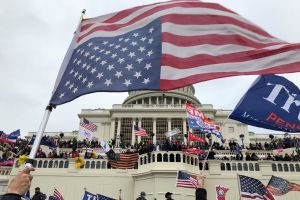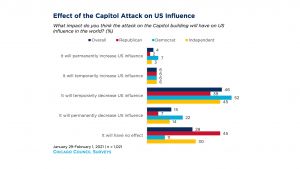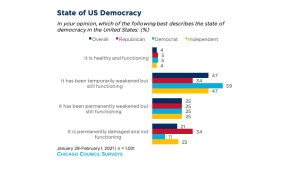Americans Expect Temporary Drop in US Influence Due to Capitol Attack

Dina Smeltz and Brendan Helm analyze public opinion data showing while most Americans think US democracy is still functioning, they believe it has been either temporarily or permanently weakened.
The second impeachment trial of former President Donald Trump begins on February 9. Trump faces the charge of inciting the January 6 storming of the US Capitol. Beyond the physical attack on the Capitol, Trump supporters’ challenge to the legitimacy of the US presidential elections has highlighted the fragility of democracy in the United States. Several commentators have even opined that the attack and events of the last four years have damaged the credibility of the United States and impeded its ability to act as an example or advocate for democracy overseas.
A Chicago Council survey conducted January 29 to February 1 shows that the US public tends to expect a temporary, not permanent, decrease in American global influence as a result of the January 6 attack. And while most Americans think US democracy is still functioning, they believe it has been either temporarily or permanently weakened.
Six in 10 Expect Decrease in US Influence
Asked about the impact of the attack on the Capitol on US influence in the world, six in 10 believe it will decrease US influence, but more say it will be a temporary decline (46%) than a permanent one (15%). Ten percent believe it will increase US influence (4% permanently, 6% temporarily), and three in 10 (28%) believe it will have no effect. While nearly half of self-described Republicans sense there will be no effect on the United States' international influence, Democrats and Independents are more likely to sense a decrease, though not a lasting one.

Most Americans Say US Democracy Is Functioning but Weakened
Few Americans consider the state of US democracy to be healthy and functioning (4%). A plurality say American democracy has been weakened temporarily but is still functioning (47%), but nearly as many say democracy in the United States has been permanently shaken: 25 percent say it has been permanently weakened though it is still functioning, and 21 percent say it has been permanently damaged and is not functioning.
A majority of Democrats and a plurality of Independents believe democracy is still functioning, even if weakened. While a third of Republicans also say US democracy is still working in a weakened state, they are more likely than others to say it has been permanently weakened or damaged. This likely reflects their dissatisfaction with the outcome of the 2020 presidential election. CNN polling has reported that 75 percent of Republicans do not think Joe Biden won the election legitimately, compared to 1 percent of Democrats and 36 percent of Independents.

Similar to partisan affiliations, supporters of Biden and Trump differ on this question. Those with very favorable views of Biden tend to believe the attack will only temporarily decrease US influence (55%) and that US democracy has been temporarily weakened but is still functioning (61%). The prevailing view among those who express a very favorable view of Trump is that the attack will have no effect on US influence globally (59%) and also that US democracy is permanently damaged and nonfunctional (43%). Even though Trump’s presidential term has ended, his profile looms large on Americans’ judgements of the political situation in the country.
Methodology
This analysis is based on data from a January 2021 Chicago Council Survey of the American public on foreign policy, a project of the Lester Crown Center on US Foreign Policy. The January 2021 Chicago Council Survey was conducted January 29–February 1, 2021 by Ipsos using its large-scale nationwide online research panel, KnowledgePanel, among a weighted national sample of 1,021 adults, 18 years or older, living in all 50 states and the District of Columbia. The margin of error is higher for partisan subgroups or for partial-sample items.
Partisan identification is based on respondents’ answer to a standard partisan self-identification question: "Generally speaking, do you think of yourself as a Republican, a Democrat, an Independent, or what?"



